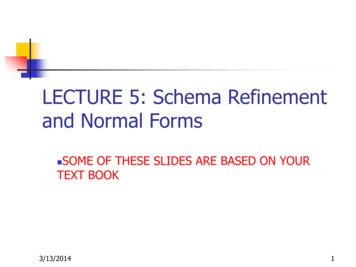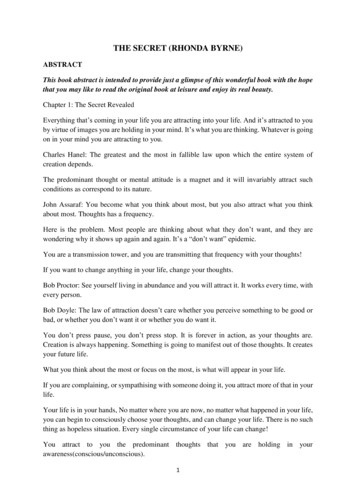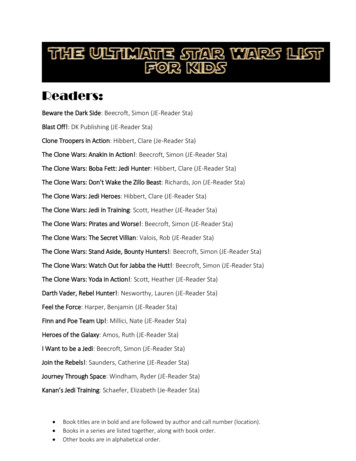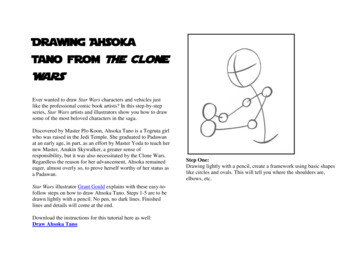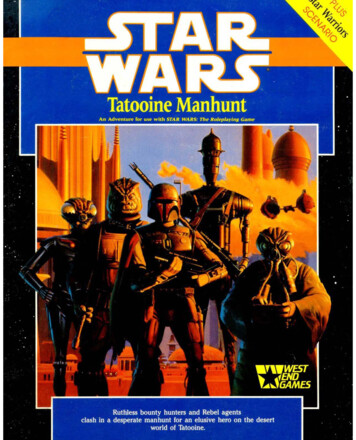
Transcription
The secret wars of the CIA - John StockwellA lecture by John Stockwell given in October, 1987 on the inner workings of the nationalsecurity council and the CIA's convert actions in Angola, Central America and Vietnam.John Stockwell is the highest-ranking CIA official ever to leave the agency and go public. Heran a CIA intelligence-gathering post in Vietnam, was the task-force commander of the CIA'ssecret war in Angola in 1975 and 1976, and was awarded the Medal of Merit before heresigned. Stockwell's book In Search of Enemies, published by W.W. Norton 1978, is aninternational best-seller.*****"I did 13 years in the CIA altogether. I sat on a subcommittee of the NSC, so I was like achief of staff, with the GS-18s (like 3-star generals) Henry Kissinger, Bill Colby (the CIAdirector), the GS-18s and the CIA, making the important decisions and my job was to put itall together and make it happen and run it, an interesting place from which to watch a covertaction being done.I testified for days before the Congress, giving them chapter and verse, date and detail,proving specific lies. They were asking if we had to do with S. Africa, that was fighting in thecountry. In fact we were coordinating this operation so closely that our airplanes, full of armsfrom the states, would meet their airplanes in Kinshasa and they would take our arms intoAngola to distribute to our forces for us.What I found with all of this study is that the subject, the problem, if you will, for the world,for the U.S. is much, much, much graver, astronomically graver, than just Angola andVietnam. I found that the Senate Church committee has reported, in their study of covertactions, that the CIA ran several thousand covert actions since 1961, and that the heyday ofcovert action was before 1961; that we have run several hundred covert actions a year, andthe CIA has been in business for a total of 37 years.What we're going to talk about tonight is the United States national security syndrome. We'regoing to talk about how and why the U.S. manipulates the press. We're going to talk abouthow and why the U.S. is pouring money into El Salvador, and preparing to invade Nicaragua;how all of this concerns us so directly. I'm going to try to explain to you the other side of
terrorism; that is, the other side of what Secretary of State Shultz talks about. In doing this,we'll talk about the Korean war, the Vietnam war, and the Central American war.Everything I'm going to talk to you about is represented, one way or another, already in thepublic records. You can dig it all out for yourselves, without coming to hear me if you sochose. Books, based on information gotten out of the CIA under the freedom of informationact, testimony before the Congress, hearings before the Senate Church committee, researchby scholars, witness of people throughout the world who have been to these target areas thatwe'll be talking about. I want to emphasize that my own background is profoundlyconservative. We come from South Texas, East Texas.I was conditioned by my training, my marine corps training, and my background, to believein everything they were saying about the cold war, and I took the job with great enthusiasm(in the CIA) to join the best and the brightest of the CIA, of our foreign service, to go out intothe world, to join the struggle, to project American values and save the world for our brand ofdemocracy. And I believed this. I went out and worked hard.What I really got out of these 6 years in Africa was a sense . that nothing we were doing infact defended U.S. national security interests very much. We didn't have many nationalsecurity interests in Bujumbura, Burundi, in the heart of Africa. I concluded that I justcouldn't see the point.We were doing things it seemed because we were there, because it was our function, we werebribing people, corrupting people, and not protecting the U.S. in any visible way. I had achance to go drinking with this Larry Devlin, a famous CIA case officer who had overthrownPatrice Lumumba, and had him killed in 1960, back in the Congo. He was moving into theAfrica division Chief. I talked to him in Addis Ababa at length one night, and he was givingme an explanation - I was telling him frankly, 'sir, you know, this stuff doesn't make anysense, we're not saving anybody from anything, and we are corrupting people, and everybodyknows we're doing it, and that makes the U.S. look bad'.And he said I was getting too big for my britches. He said, you're trying to think like thepeople in the NSC back in Washington who have the big picture, who know what's going onin the world, who have all the secret information, and the experience to digest it. If theydecide we should have someone in Bujumbura, Burundi, and that person should be you, thenyou should do your job, and wait until you have more experience, and you work your way upto that point, then you will understand national security, and you can make the big decisions.Now, get to work, and stop, you know, this philosophizing.'And I said, Aye-aye sir, sorry sir, a bit out of line sir'. It's a very powerful argument, ourpresidents use it on us. President Reagan has used it on the American people, saying, if youknew what I know about the situation in Central America, you would understand why it'snecessary for us to intervene.'I went back to Washington, however, and I found that others shared my concern. A formalstudy was done in the State Department and published internally, highly classified, called theMacomber [sp?] report, concluding that the CIA had no business being in Africa for anythingit was known to be doing, that our presence there was not justified, there were no nationalsecurity interests that the CIA could address any better than the ambassador himself. Wedidn't need to have bribery and corruption as a tool for doing business in Africa at that time.I went from . a tour in Washington to Vietnam. And there, my career, and my life, began toget a little bit more serious. They assigned me a country. It was during the cease-fire, '73 to'75. There was no cease-fire. Young men were being slaughtered. I saw a slaughter. 300young men that the South Vietnamese army ambushed. Their bodies brought in and laid out
in a lot next to my compound. I was up-country in Tayninh. They were laid out next door,until the families could come and claim them and take them away for burial.I thought about this. I had to work with the sadistic police chief. When I reported that he likedto carve people with knives in the CIA safe-house - when I reported this to my bosses, theysaid, (1). The post was too important to close down. (2). They weren't going to get the mantransferred or fired because that would make problems, political problems, and he was verygood at working with us in the operations he worked on. (3). Therefore if I didn't have thestomach for the job, that they could transfer me.'But they hastened to point out, if I did demonstrate a lack of moral fiber' to handle workingwith the sadistic police chief, that I wouldn't get another good job in the CIA, it would be amark againstmy career.So I kept the job, I closed the safe-house down, I told my staff that I didn't approve of thatkind of activity, and I proceeded to work with him for the next 2 years, pretending that I hadreformed him, and he didn't do this sort of thing anymore. The parallel is obvious with ElSalvador today, where the CIA, the state department, works with the death squads.They don't meet the death squads on the streets where they're actually chopping up people orlaying them down on the street and running trucks over their heads. The CIA people in SanSalvador meet the police chiefs, and the people who run the death squads, and they do liaisewith them, they meet them beside the swimming pool of the villas. And it's a sophisticated,civilized kind of relationship. And they talk about their children, who are going to school atUCLA or Harvard and other schools, and they don't talk about the horrors of what's beingdone. They pretend like it isn't true.What I ran into in addition to that was a corruption in the CIA and the intelligence businessthat made me question very seriously what it was all about, including what I was doing .risking my life . what I found was that the CIA, us, the case officers, were not permitted toreport about the corruption in the South Vietnamese army.Now, the corruption was so bad, that the S. Vietnamese army was a skeleton army. Colonelswould let the troops go home if they would come in once a month and sign the pay vouchersso the colonel could pocket the money. Then he could sell half of the uniforms and boots andM-16's to the communist forces - that was their major supply, just as it is in El Salvadortoday. He could use half of the trucks to haul produce, half of the helicopters to haul heroin.And the Army couldn't fight. And we lived with it, and we saw it, and there was no doubt everybody talked about it openly. We could provide all kinds of proof, and they wouldn't letus report it. Now this was a serious problem because the south was attacked in the winter of1975, and it collapsed like a big vase hit by a sledgehammer. And the U.S. was humiliated,and that was the dramatic end of our long involvement in Vietnam.I had been designated as the task-force commander that would run this secret war [in Angolain 1975 and 1976]. and what I figured out was that in this job, I would sit on a subcommittee of the National Security Council, this office that Larry Devlin has told me aboutwhere they had access to all the information about Angola, about the whole world, and Iwould finally understand national security. And I couldn't resist the opportunity to know. Iknew the CIA was not a worthwhile organization, I had learned that the hard way. But thequestion was where did the U.S. government fit into this thing, and I had a chance to see formyself in the next big secret war.I wanted to know if wise men were making difficult decisions based on truly important,threatening information, threatening to our national security interests. If that had been the
case, I still planned to get out of the CIA, but I would know that the system, the invisiblegovernment, our national security complex, was in fact justified and worth while. And so Itook the job. Suffice it to say I wouldn't be standing in front of you tonight if I had foundthese wise men making these tough decisions. What I found, quite frankly, was fat old mensleeping through sub-committee meetings of the NSC in which we were making decisionsthat were killing people in Africa. I mean literally. Senior ambassador Ed Mulcahy. wouldgo to sleep in nearly every one of these meetings.You can change the names in my book [about Angola] [13] and you've got Nicaragua. thebasic structure, all the way through including the mining of harbors, we addressed all of theseissues. The point is that the U.S. led the way at every step of the escalation of the fighting.We said it was the Soviets and the Cubans that were doing it. It was the U.S. that wasescalating the fighting. There would have been no war if we hadn't gone in first. We put armsin, they put arms in. We put advisors in, they answered with advisors. We put in Zairian paracommando battalions, they put in Cuban army troops. We brought in the S. African army,they brought in the Cuban army. And they pushed us away. They blew us away because wewere lying, we were covering ourselves with lies, and they were telling the truth. And it wasnot a war that we could fight. We didn't have interests there that should have been defendedthat way.There was never a study run that evaluated the MPLA, FNLA and UNITA, the threemovements in the country, to decide which one was the better one. The assistant secretary ofstate for African affairs, Nathaniel Davis, no bleeding-heart liberal (he was known by somepeople in the business as the butcher of Santiago), he said we should stay out of the conflictand work with whoever eventually won, and that was obviously the MPLA. Our consul inLuanda, Tom Killoran, vigorously argued that the MPLA was the best qualified to run thecountry and the friendliest to the U.S.We brushed these people aside, forced Matt Davis to resign, and proceeded with our war. TheMPLA said they wanted to be our friends, they didn't want to be pushed into the arms of theSoviet Union; they begged us not to fight them, they wanted to work with us. We said theywanted a cheap victory, they wanted a walk-over, they wanted to be un-opposed, that wewouldn't give them a cheap victory, we would make them earn it, so to speak. And we did.10,000 Africans died and they won the victory that they were winning anyway.Now, the most significant thing that I got out of all of this, in addition to the fact that ourrationales were basically false, was that we lied. To just about everybody involved. One thirdof my staff in this task force that I put together in Washington, commanding this globaloperation, pulling strings all over the world to focus pressure onto Angola, and militaryactivities into Angola, one third of my staff was propagandists, who were working, in everyway they could to create this picture of Cubans raping Angolans, Cubans and Sovietsintroducing arms into the conflict, Cubans and Russians trying to take over the world.Our ambassador to the United Nations, Patrick Moynihan, he read continuous statements ofour position to the Security Council, the general assembly, and the press conferences, sayingthe Russians and Cubans were responsible for the conflict, and that we were staying out, andthat we deplored the militarization of the conflict.And every statement he made was false. And every statement he made was originated in thesub-committee of the NSC that I sat on as we managed this thing. The state department pressperson read these position papers daily to the press. We would write papers for him. Fourparagraphs. We would call him on the phone and say, call us 10 minutes before you go on,the situation could change overnight, we'll tell you which paragraph to read. And all fourparagraphs would be false. Nothing to do with the truth. Designed to play on events, to create
this impression of Soviet and Cuban aggression in Angola. When they were in factresponding to our initiatives.And the CIA director was required by law to brief the Congress. This CIA director Bill Colby- the same one that dumped our people in Vietnam - he gave 36 briefings of the Congress, theoversight committees, about what we were doing in Angola. And he lied. At 36 formalbriefings. And such lies are perjury, and it's a felony to lie to the Congress.He lied about our relationship with South Africa. We were working closely with the SouthAfrican army, giving them our arms, coordinating battles with them, giving them fuel fortheir tanks and armored cars. He said we were staying well away from them. They wereconcerned about these white mercenaries that were appearing in Angola, a very sensitiveissue, hiring whites to go into a black African country, to help you impose your will on thatblack African country by killing the blacks, a very sensitive issue. The Congress wasconcerned we might be involved in that, and he assured them we had nothing to do with it.We had in fact formed four little mercenary armies and delivered them into Angola to do thisdirty business for the CIA. And he lied to them about that. They asked if we were puttingarms into the conflict, and he said no, and we were. They asked if we had advisors inside thecountry, and he said no, we had people going in to look at the situation and coming backout'. We had 24 people sleeping inside the country, training in the use of weapons, installingcommunications systems, planning battles, and he said, we didn't have anybody inside thecountry.In summary about Angola, without U.S. intervention, 10,000 people would be alive that werekilled in the thing. The outcome might have been peaceful, or at least much less bloody. TheMPLA was winning when we went in, and they went ahead and won, which was, accordingto our consul, the best thing for the country.At the end of this thing the Cubans were entrenched in Angola, seen in the eyes of much ofthe world as being the heroes that saved these people from the CIA and S. African forces. Wehad allied the U.S. literally and in the eyes of the world with the S. African army, and that'sillegal, and it's impolitic. We had hired white mercenaries and eventually been identified withthem. And that's illegal, and it's impolitic. And our lies had been visible lies. We were caughtout on those lies. And the world saw the U.S. as liars.After it was over, you have to ask yourself, was it justified? What did the MPLA do after theyhad won? Were they lying when they said they wanted to be our friends? 3 weeks after wewere shut down. the MPLA had Gulf oil back in Angola, pumping the Angolan oil from theoilfields, with U.S. gulf technicians protected by Cuban soldiers, protecting them from CIAmercenaries who were still mucking around in Northern Angola.You can't trust a communist, can you? They proceeded to buy five 737 jets from BoeingAircraft in Seattle. And they brought in 52 U.S. technicians to install the radar systems toland and take-off those planes. They didn't buy [the Soviet Union's] Aeroflot. DavidRockefeller himself tours S. Africa and comes back and holds press conferences, in which hesays that we have no problem doing business with the so-called radical states of SouthernAfrica.I left the CIA, I decided that the American people needed to know what we'd done in Angola,what we'd done in Vietnam. I wrote my book. I was fortunate - I got it out. It was a bestseller. A lot of people read it. I was able to take my story to the American people. Got on 60minutes, and lots and lots of other shows.I testified to the Congress and then I began my education in earnest, after having been taughtto fight communists all my life. I went to see what communists were all about. I went to Cuba
to see if they do in fact eat babies for breakfast. And I found they don't. I went to Budapest, acountry that even national geographic admits is working nicely. I went to Jamaica to talk toMichael Manley about his theories of social democracy.I went to Grenada and established a dialogue with Maurice Bishop and Bernard Cord andPhyllis Cord, to see - these were all educated people, and experienced people - and they had atheory, they had something they wanted to do, they had rationales and explanations - and Iwent repeatedly to hear them. And then of course I saw the U.S., the CIA mounting a covertaction against them, I saw us orchestrating our plan to invade the country. 19 days before hewas killed, I was in Grenada talking to Maurice Bishop about these things, these indicators,the statements in the press by Ronald Reagan, and he and I were both acknowledging that itwas almost certain that the U.S. would invade Grenada in the near future.I read as many books as I could find on the subject - book after book after book. I've gotseveral hundred books on the shelf over my desk on the subject of U.S. national securityinterests. And by the way, I urge you to read. In television you get capsules of news thatsomeone else puts together what they want you to hear about the news. In newspapers youget what the editors select to put in the newspaper. If you want to know about the world andunderstand, to educate yourself, you have to get out and dig, dig up books and articles foryourself. Read, and find out for yourselves. As you'll see, the issues are very, very important.I also was able to meet the players, the people who write, the people who have done studies,people who are leading different situations. I went to Nicaragua a total of 7 times. This was amajor covert action. It lasted longer and evolved to be bigger than what we did in Angola. Itgave me a chance, after running something from Washington, to go to a country that wasunder attack, to talk to the leadership, to talk to the people, to look and see what happenswhen you give white phosporous or grenades or bombs or bullets to people, and they goinside a country, to go and talk to the people, who have been shot, or hit, or blown up.We're talking about 10 to 20 thousand covert actions [the CIA has performed since 1961].What I found was that lots and lots of people have been killed in these things. Some ofthem are very, very bloody.The Indonesian covert action of 1965, reported by Ralph McGehee, who was in that areadivision, and had documents on his desk, in his custody about that operation. He said that oneof the documents concluded that this was a model operation that should be copied elsewherein the world. Not only did it eliminate the effective communist party (Indonesian communistparty), it also eliminated the entire segment of the population that tended to support thecommunist party - the ethnic Chinese, Indonesian Chinese. And the CIA's report put thenumber of dead at 800,000 killed. And that was one covert action. We're talking about 1 to 3million people killed in these things.Two of these things have led us directly into bloody wars. There was a covert action againstChina, destabilizing China, for many, many years, with a propaganda campaign to work up amood, a feeling in this country, of the evils of communist China, and attacking them, as we'redoing in Nicaragua today, with an army that was being launched against them to parachute inand boat in and destabilize the country. And this led us directly into the Korean war.U.S. intelligence officers worked over Vietnam for a total of 25 years, with greater andgreater involvement, massive propaganda, deceiving the American people about what washappening. Panicking people in Vietnam to create migrations to the south so they couldphotograph it and show how people were fleeing communism. And on and on, until they gotus into the Vietnam war, and 2,000,000 people were killed.
There is a mood, a sentiment in Washington, by our leadership today, for the past 4 years,that a good communist is a dead communist. If you're killing 1 to 3 million communists,that's great. President Reagan has gone public and said he would reduce the Soviet Union to apile of ashes. The problem, though, is that these people killed by our national securityactivities are not communists. They're not Russians, they're not KGB. In the field we used toplay chess with the KGB officers, and have drinks with them. It was like professional footballplayers - we would knock heads on Sunday, maybe in an operation, and then Tuesday you'reat a banquet together drinking toasts and talking.The people that are dying in these things are people of the third world. That's the commondenominator that you come up with. People of the third world. People that have themisfortune of being born in the Metumba mountains of the Congo, in the jungles of SoutheastAsia, and now in the hills of northern Nicaragua. Far more Catholics than communists, farmore Buddhists than communists. Most of them couldn't give you an intelligent definition ofcommunism, or of capitalism.Central America has been a traditional target of U.S. dominion. If you want to get an easyread of the history of our involvement in Central America, read Walter LaFeber's book,Inevitable Revolutions. [8] We have dominated the area since 1820. We've had a policy ofdominion, of excluding other countries, other industrial powers from Europe, from competingwith us in the area.Just to give you an example of how complete this is, and how military this has been, between1900 and W.W. II, we had 5,000 marines in Nicaragua for a total of 28 years. We invaded theDominican Republic 4 times. Haiti, we occupied it for 12 years. We put our troops into Cuba4 times, Panama 6 times, Guatemala once, plus a CIA covert action to overthrow thedemocratic government there once. Honduras, 7 times. And by the way, we put 12,000 troopsinto the Soviet Union during that same period of time.In the 1930's there was public and international pressure about our marines in Nicaragua.The next three leaders of Guatemala [after the CIA installed the puppet, Colonel Armaz in acoup] died violent deaths, and Amnesty International tells us that the governments we'vesupported in power there since then, have killed 80,000 people. You can read about that onein the book Bitter Fruit, by Schlesinger and Kinzer. [5] Kinzer's a New York TimesJournalist. or Jonathan Kwitny, the Wall Street Journal reporter, his book Endless Enemies[7] - all discuss this.However, the money, the millions and millions of dollars we put into this program [helpingCentral America] inevitably went to the rich, and not to the people of the countries involved.And while we were doing this, while we were trying, at least saying we were trying, tocorrect the problems of Central and Latin America, the CIA was doing its thing, too. The CIAwas in fact forming the police units that are today the death squads in El Salvador. With theleaders on the CIA's payroll, trained by the CIA and the United States.We had the public safety program' going throughout Central and Latin America for 26 years,in which we taught them to break up subversion by interrogating people. Interrogation,including torture, the way the CIA taught it. Dan Metrione, the famous exponent of thesethings, did 7 years in Brazil and 3 in Uruguay, teaching interrogation, teaching torture. Hewas supposed to be the master of the business, how to apply the right amount of pain, at justthe right times, in order to get the response you want from the individual.They developed a wire. They gave them crank generators, with U.S. AID' written on theside, so the people even knew where these things came from. They developed a wire that wasstrong enough to carry the current and fine enough to fit between the teeth, so you could put
one wire between the teeth and the other one in or around the genitals and you could crankand submit the individual to the greatest amount of pain, supposedly, that the human bodycan register.Now how do you teach torture? Dan Metrione: I can teach you about torture, but sooner orlater you'll have to get involved. You'll have to lay on your hands and try it yourselves.'. All they [the guinea pigs, beggars from off the streets] could do was lie there and scream.And when they would collapse, they would bring in doctors and shoot them up with vitaminB and rest them up for the next class. And when they would die, they would mutilate thebodies and throw them out on the streets, to terrify the population so they would be afraid ofthe police and the government.And this is what the CIA was teaching them to do. And one of the women who was in thisprogram for 2 years - tortured in Brazil for 2 years - she testified internationally when sheeventually got out. She said, The most horrible thing about it was in fact, that the peopledoing the torture were not raving psychopaths.' She couldn't break mental contact with themthe way you could if they were psychopath. They were very ordinary people.There's a lesson in all of this. And the lesson is that it isn't only Gestapo maniacs, or KGBmaniacs, that do inhuman things to other people, it's people that do inhuman things to otherpeople. And we are responsible for doing these things, on a massive basis, to people of theworld today. And we do it in a way that gives us this plausible denial to our own consciences;we create a CIA, a secret police, we give them a vast budget, and we let them go and runthese programs in our name, and we pretend like we don't know it's going on, although theinformation is there for us to know; and we pretend like it's ok because we're fighting somevague communist threat. And we're just as responsible for these 1 to 3 million people we'veslaughtered and for all the people we've tortured and made miserable, as the Gestapo was thepeople that they've slaughtered and killed. Genocide is genocide!Now we're pouring money into El Salvador. A billion dollars or so. And it's a documentedfact that the. 14 families there that own 60% of the country are taking out between 2 to 5billion dollars - it's called de-capitalization - and putting it in banks in Miami andSwitzerland. Mort Halper, in testifying to a committee of the Congress, he suggested wecould simplify the whole thing politically just by investing our money directly in the Miamibanks in their names and just stay out of El Salvador altogether. And the people would bebetter off.Nicaragua. What's happening in Nicaragua today is covert action. It's a classic destabilization program. In November 16, 1981, President Reagan allocated 19 million dollarsto form an army, a force of contras, they're called, ex-Somoza national guards, the monsterswho were doing the torture and terror in Nicaragua that made the Nicaraguan people rise upand throw out the dictator, and throw out the guard. We went back to create an army of thesepeople. We are killing, and killing, and terrorizing people. Not only in Nicaragua but theCongress has leaked to the press - reported in the New York Times, that there are 50 covertactions going around the world today, CIA covert actions going on around the world today.You have to be asking yourself, why are we destabilizing 50 corners of the troubled world?Why are we about to go to war in Nicaragua, the Central American war? It is the function, Isuggest, of the CIA, with its 50 de-stabilization programs going around the world today, tokeep the world unstable, and to propagandize the American people to hate, so we will let theestablishment spend any amount of money on arms.
The Victor Marquetti ruling of the Supreme Court gave the government the right toprepublication censorship of books. They challenged 360 items in his 360 page book. Hefought it in court, and eventually they deleted some 60 odd items in his book.The Frank Snep r
The secret wars of the CIA - John Stockwell A lecture by John Stockwell given in October, 1987 on the inner workings of the national security council and the CIA's convert actions in Angola, Central America and Vietnam. John Stockwell is the highest-ranking CIA official ever to leave the agency and go public. He




